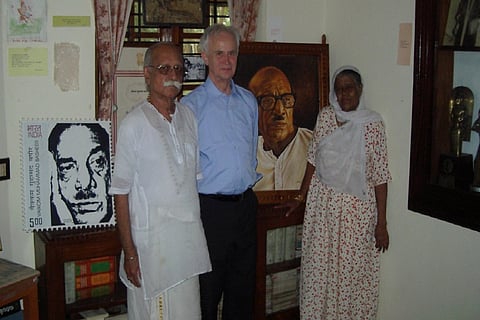

Nearly seven decades ago, Ronal Eaton Asher, a young linguistic scholar from the United Kingdom, fascinated by Dravidian languages, travelled all the way to Changam, a village in the erstwhile North Arcot district of Tamil Nadu. He carried with him a weighty reel-to-reel Ferrograph recorder to tape conversations during his field research that would eventually help him widen his understanding of colloquial Tamil.
The decades he spent researching the sister languages Tamil and Malayalam brought him closer to litterateurs from both the states and its people. The ties deepened as his translation projects and scholarly writings brought the writers and the languages international recognition.
In Kerala, he is known for his translations of Vaikkom Mohammed Basheer and Thakazhi Sivasanakara Pillai, with whom he shared a special bond. In Tamil, he translated poetry of Subrahmanya Bharati and the short stories of Pudumaipithan, a project jointly undertaken with VS Subrahmanyam.
Asher, a polyglot and Professor Emeritus at the University of Edinburgh, breathed his last the day after Christmas in December 2022. None of his well-wishers knew about his death until P Sreekumar, an Associate Professor of Linguistics at the Central University of Kerala, received an email from Asher's son intimating his sad demise on the morning of January 11.
"I was his student at the University of Edinburgh and we used to keep contact over emails regularly. When they stopped suddenly, I was worried and wrote a flurry of emails requesting a reply. His son saw them and wrote to me saying Asher passed away at the age of 96 after Christmas," says Sreekumar.
Born in 1926 at Gringley-on-the-Hill, a village in Nottinghamshire, Asher studied languages at University College, London. Sreekumar says it was Joseph Minattur, a postgraduate student of University of London, who taught Asher Malayalam alphabets using a series of readers prepared for the primary classes in Kerala schools. Asher joined the School of Oriental and African Studies (SOAS) in London towards the end of his doctoral research as a faculty and it was here that he picked up an interest in Tamil, which deepened his wish to explore Dravidian languages.
In 1975, he translated Thakazhi Sivasankara Pillai's 1947 novel Thottiyude Makan as Scavenger's Son. In 1980, he co-translated with Achamma Chandrasekharan, three works of Vaikkom Muhammad Basheer — Balyakalasakhi (Childhood Friend), Ntuppuppakkoranendarnnu (Me grandad 'ad an elephant) and Pathumayude Aadu (Pathumma's Goat).
“His Basheer translations brought global attention to Malayalam language and literature. They also spawned many translations in other Indian languages,” says K Satchidanandan, president, Kerala Sahitya Akademi. He was awarded a gold medal by the Kerala Sahitya Akademi in 1983 for distinguished services to Malayalam language and literature. The Kendra Sahitya Akademi also bestowed on him an honorary fellowship for his contributions. He continued to interact with writers in the state years after retirement from active academic life and made efforts to translate works and write essays on literature. In 2002, he translated the KP Ramanunni novel Sufi Paranja Katha, with N Gopalakrishnan, as What the Sufi Said. Two years later, he edited a volume of translation of Malayalam modernist fiction titled Wind Flowers.
In the mid-1950s, when he was at SOAS, he spent considerable time in South India, to deepen his understanding of colloquial Tamil. He also became acquainted with works of Subrahmanya Bharati and Tamil Sangam poetry. In 1971, he co-authored A Tamil Prose Reader, his first book in the language, with R Radhakrishnan. Sreekumar says that other than Kamil V Zvelebil and Herman Gundert, no one from outside India has contributed as much as Asher did for the advancement of linguistic studies in Tamil and Malayalam. Asher also published two works of Tamil grammar in 1982 and in 2002. "A Tamil Prose Reader co-edited with R Radhakrishnan in 1971 and Some Landmarks in the History of Tamil Prose in 1973 are the substantial outcomes of his interest in Tamil prose," says Sreekumar.